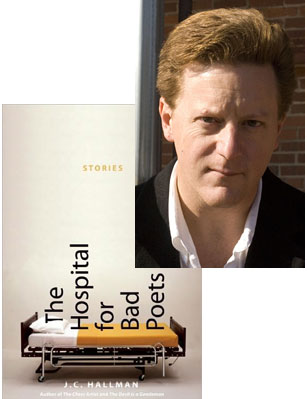J.C. Hallman, Lost In His Own Funhouse

J.C. Hallman uses a variety of metafictional starting points to set the stories in The Hospital for Bad Poets in motion. In the title story, for example, the critical treatment of an emerging poet is treated as if it were a medical diagnosis; “The History of Riddles” takes a couple preparing to entertain another couple in their home as an opportunity for philosophical reflection upon the ritualistic nature of games and social bonding. Then there’s “Double Entendre,” which is simultaneously an erotic story and a structural analysis of erotic stories—and in this essay, Hallman talks about the classic postmodern short story that inspired him to work within that particular framework.
If I think back through The Hospital for Bad Poets and compile a list of the authors and stories that I was more or less consciously emulating while I wrote, I pretty quickly wind up with the table of contents of an anthology I’d buy given the opportunity:
- “The Hunger Artist,” Franz Kafka
- “The Old Forest,” Peter Taylor
- “Dreams of a Robot Dancing Bee,” James Tate
- “The Swimmer” and “The Enormous Radio,” John Cheever
- “Star Food,” Ethan Canin
- “The Lottery,” Shirley Jackson
…and most important for this essay:
- “Lost in the Funhouse,” John Barth
Excavating one’s own literary heritage is both interesting and problematic. It’s interesting from a critical standpoint—assuming you find origins interesting—and it’s problematic for the same reason that civilizations in Italy are problematic: dig for bedrock and all you find beneath you are the folks who got there first, the ones that beat you to it. Plus, it’s not really supposed to work like that, is it? That is, at least when it comes to fiction, we expect a little imitation early in one’s career—the bush leagues, call it—but eventually you’re supposed to discover your “voice,” sail for terra incognita, volley forth like St. George to wherever there be dragons.
Except it’s never really been like that for me. And I’ve always been a bit jealous of poets in this regard.
Poets aren’t quite so hung up on the whole question of originality of voice. Instead, they allow that they follow “after” one another, and celebrate poems that were written with another poet in mind. Credit where credit is due! The ongoing dialogue! It may be a little disloyal to say it, but poets, on average, despite all this copying of one another, seem to wind up more original than fiction writers in the end.
Which is perhaps why I don’t mind acknowledging that some of my stories have pretty clear sources or inspirations. This is true for one story far more than most in The Hospital for Bad Poets: “Double Entendre,” which I thought of as my own personal “Lost in the Funhouse.” More specifically, I thought of it as the “Lost in the Funhouse” of erotic writing.
There are several stories in the book that critique stories or poems, in one way or another: “Carlson’s Team” plays around with sitcom tropes, the title story obviously has something (positive, ultimately) to say about poetry, and “Double Entendre” looks at literature through the lens of the history of erotic writing. In each case, I had “Lost in the Funhouse” in the back of my mind—which means that as a writer I had begun to think postmodernly.
A trajectory spanning the chasm between fabulist writing and postmodern writing is what you trace if you consider that fanciful table of contents above. And I suppose it’s one way of understanding The Hospital for Bad Poets. But of course it’s not like I set out to do that—or set out to do anything else. The only thing I set out to do is create, or recreate, something which had pleased me. In this case, “Lost in the Funhouse.” But imitation never quite works either, does it? Indeed, Barth himself once acknowledged that he never sat down and tried to write John Barth stories. Rather, every time, he tried to write like Dickens—it just came out like Barth.
And thus with all of us. Influence? Why be anxious? Poets aren’t.
19 July 2009 | selling shorts |

 Our Endless and Proper Work is my new book with Belt Publishing about starting (and sticking to) a productive writing practice.
Our Endless and Proper Work is my new book with Belt Publishing about starting (and sticking to) a productive writing practice. 
